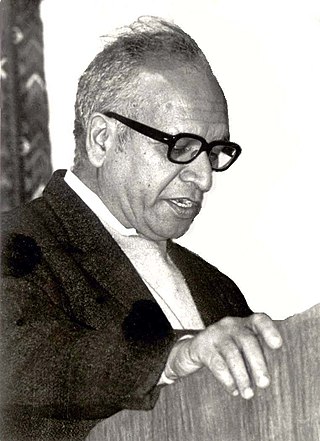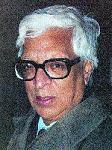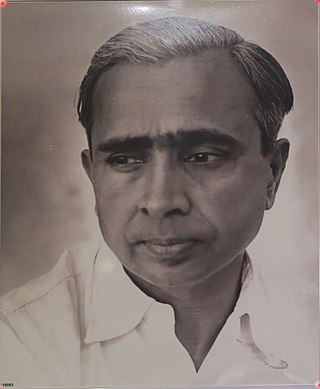
Bipan Chandra was an Indian historian, specialising in economic and political history of modern India. An emeritus professor of modern history at Jawaharlal Nehru University, he specialized on the Indian independence movement and is considered a leading scholar on Mahatma Gandhi. He authored several books, including The Rise and Growth of Economic Nationalism.

Jawaharlal Nehru University (JNU) is a public major research university located in New Delhi, India. It was established in 1969 and named after Jawaharlal Nehru, India's first Prime Minister. The university is known for leading faculties and research emphasis on social sciences and applied sciences.
B. S. Chimni is a legal scholar and academic who is presently distinguished professor of international law member at Jindal Global Law School. His areas of expertise include international law, international trade law and international refugee law. He has been chairperson of the Centre for International Legal Studies at Jawaharlal Nehru University, New Delhi. He had a 2+1⁄2-year stint as vice chancellor of the West Bengal National University of Juridical Sciences. He has been a visiting professor at the International Center for Comparative Law and Politics, Tokyo University, a Fulbright Visiting Scholar at Harvard Law School, visiting fellow at Max Planck Institute for Comparative Public Law and International Law, Heidelberg, and a visiting scholar at the Refugee Studies Center, York University, Canada.
V. S. Mani was an Indian legal scholar. He was the founder and director of Gujarat National Law University and an expert in the field of public international law. He was also the founder and director of the Seedling School of Law and Governance at Jaipur National University in Rajasthan, India. He died on 22 August 2016.

Sarvepalli Gopal was a well-known Indian historian. He was the son of Sarvepalli Radhakrishnan, the first Vice-President and the second President of India. He was the author of the Radhakrishnan: A Biography and Jawaharlal Nehru: A Biography.

Kesava Shankar Pillai, better known as Shankar, was an Indian cartoonist. He is considered the father of political cartooning in India. He founded Shankar's Weekly, India's Punch in 1948. Shankar's Weekly also produced cartoonists like Abu Abraham, Ranga and Kutty, he closed down the magazine during the Emergency of 25 June 1975. From then on he turned to making children laugh and enjoy life.

Sukhadeo Thorat an Indian economist, educationist, professor and writer. He is the former chairman of the University Grants Commission. He is professor emeritus in Centre for the Study of Regional Development, Jawaharlal Nehru University. He is an expert on B. R. Ambedkar.

Deepak Nayyar is an Indian economist and academician. He is a professor of economics at Jawaharlal Nehru University, New Delhi and Chairperson of the Board of Governors of Centre for the Study of Developing Societies (CSDS) New Delhi. He has taught at the University of Oxford, the University of Sussex, the Indian Institute of Management Calcutta (IIM-C), and the New School for Social Research, New York City. He was Vice Chancellor of the University of Delhi from 2000 to 2005.

Geeta Kapur is a noted Indian art critic, art historian and curator based in New Delhi. She was one of the pioneers of critical art writing in India, and who, as Indian Express noted, has "dominated the field of Indian contemporary art theory for three decades now". Her writings include artists' monographs, exhibition catalogues, books, and sets of widely anthologized essays on art, film, and cultural theory.
Barid Baran Bhattacharya was an Indian economist and educationist. He was vice-chancellor of Jawaharlal Nehru University. He was also Director and Professor at the Institute of Economic Growth, Delhi.
Subhash C. Kashyap is a former Secretary-General of 7th Lok Sabha, 8th Lok Sabha and 9th Lok Sabha and Lok Sabha Secretariat from 1984 to 1990. He is also a well known political scientist, an expert in the Indian Constitution, Constitutional Law, Parliamentary Experts and a distinguished scholar. He also headed an International Centre for Parliamentary Documentation, IPU at Geneva till 1983. Kashyap was Honorary Constitutional Advisor to the Government of India on Panchayati Raj Laws and Institutions. He is also Recipient of several prestigious awards for the Best Books in Constitution, Law and Political Science. At present Dr. Kashyap is an Honorary Research Professor at the Centre for Policy Research (CPR), New Delhi. He was also a Member of the National Commission to Review the Working of Constitution and Chairman of its Drafting and Editorial Committee.
Madhavan Kezhkepat Palat is an Indian historian, scholar of modern world, and political commentator. He is an expert on European and Russian history. In an academic career extending over nearly five decades, he has played a seminal role in promoting understanding of Russian history, culture, literature, and society in India.

Naman P. Ahuja is an art historian and curator based in New Delhi. He is Professor of Indian Art and Architecture at Jawaharlal Nehru University, New Delhi where his research and graduate teaching focus on Indian iconography and sculpture, temple architecture and Sultanate-period painting. He is also the Editor of Marg, India’s leading quarterly magazine and journal on the arts, published from Mumbai. His studies on privately owned objects—terracottas, ivories and small finds—have drawn attention to a wide range of ritual cultures and transcultural exchanges at an everyday, quotidian level. He has curated several exhibitions, most notably The Body in Indian Art and Thought, and published books, including The Making of the Modern Indian Artist Craftsman: Devi Prasad.

Professor Anvita Abbi is an Indian linguist and scholar of minority languages, known for her studies on tribal languages and other minority languages of South Asia. In 2013, she was honoured with the Padma Shri, the fourth highest civilian award by the Government of India for her contributions to the field of linguistics.
Bal Krishen Thapar was an Indian archaeologist who served as the Director-general of the Archaeological Survey of India from 1978 to 1981. He was the founder of INTACH.
Sudhir Kumar Sopory is an Indian educationist, plant physiologist, scientist and former vice chancellor of Jawaharlal Nehru University, New Delhi. He is known to be the first to purify a protein kinase C activity from plants and is credited with the identification of topoisomerase as a substrate of protein kinase C. He is an elected Fellow of several major Indian science academies and The World Academy of Sciences (TWAS) and is a recipient of many honours, including the 1987 Shanti Swarup Bhatangar Prize, the highest Indian award in the science and technology categories. The Government of India awarded him the fourth highest civilian honour of the Padma Shri, in 2007, for his contributions to science and technology.
Science and technology studies (STS) in India is a fast growing field of academic inquiry in India since the 1980s. STS has developed in the country from the science movements of the 1970s and 1980s as well as the scholarly criticism of science and technology policies of the Indian state. Now the field is established with at least five generations of scholars and several departments and institutes specialising in science, technology and innovation policy studies.
Deepak Gaur was an Indian molecular biologist, and a professor at the School of Biotechnology of Jawaharlal Nehru University. Known for his studies on Plasmodium falciparum, Gaur is a recipient of the N-Bios Prize. The Council of Scientific and Industrial Research, the apex agency of the Government of India for scientific research, awarded him the Shanti Swarup Bhatnagar Prize for Science and Technology, one of the highest Indian science awards, for his contributions to medical sciences in 2017.
Yogesh Kumar Tyagi is an Indian academic. He is the 22nd Vice Chancellor of University of Delhi. He was former Dean of Faculty of legal studies, South Asian University and is credited with the establishment of an excellent department for International Law. He has published a famous work on UN Human Rights Committee(Cambridge University Press). He has published extensively in International journals.
Pratiksha Baxi is an Indian sociologist and feminist legal scholar, whose research has focused on courtroom procedures, ethnography and sexual violence against women. She is currently a member of the faculty in Jawaharlal Nehru University's Center for the Study of Law and Governance.








